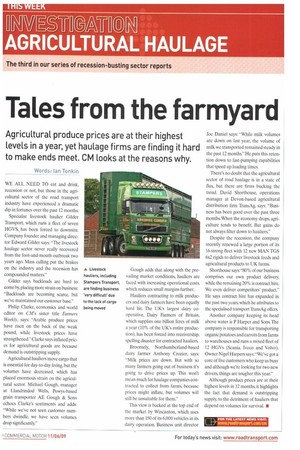Tales from the farmyard
Page 20

If you've noticed an error in this article please click here to report it so we can fix it.
Agricultural produce prices are at their highest Levels in a year, yet haulage firms are finding it hard to make ends meet. CM looks at the reasons why.
Words: Ian Tonkin
WE ALL NEED TO eat and drink, recession or not, but those in the agricultural sector of the road transport industry have experienced a dramatic dip in fortunes over the past 12 months.
Specialist livestock haulier Gilder Transport, which runs a fleet of seven HGVS,. has been forced to downsize. Company founder and managing director Edward Gilder says: "The livestock haulage sector never really recovered from the foot-and-mouth outbreak two years ago. Mass culling put the brakes on the industry and the recession has compounded matters" Gilder says backloads arc hard to come by, placing more strain on business: "Backloads are becoming scarce, but we've maintained our customer base."
Philip Clarke, economics and world editor on CM's sister title Farmen Weekly, says: "Arable produce prices have risen on the back of the weak pound, while livestock prices have strengthened." Clarke says inflated prices for agricultural goods are because demand is outstripping supply.
Agricultural hauliers move cargo that is essential for day-to-day living, but the volumes have decreased, which has placed enormous strain on the agricultural sector. Michael Gough, manager at Llandrindod Wells, Powys-based grain transporter AE Gough & Sons echoes Clarke's sentiments and adds: "While we've not seen customer numbers dwindle, we have seen volumes drop significantly." Gough adds that along with the prevailing market conditions, hauliers are faced with increasing operational costs, which reduces small margins further.
Hauliers contracting to milk producers and dairy farmers have been equally hard hit. The UK's largest dairy cooperative, Dairy Farmers of Britain, which supplies one billion litres of milk a year (10% of the UK's entire production), has been forced into receivership, spelling disaster for contracted hauliers.
Broomely, Northumberland-based dairy farmer Anthony Crozier, says: "Milk prices are down. But with so many farmers going out of business it's going to drive prices up. This won't mean much for haulage companies contracted to collect from farms, because prices might inflate, but volumes will still be unsuitable for them."
This view is backed at the top end of the market by Wincanton, which uses more than 150 of its 6,000 vehicles in its dairy operation. Business unit director Joe Daniel says: -While milk volumes are down on last year, the volume of milk we transported remained steady in the past 12 months" He puts this retention down to fast-pumping capabilities that speed up loading times There's no doubt that the agricultural sector of road haulage is in a state of flux, but there are firms bucking the trend. David Shorthouse, operations manager at Devon-based agricultural distribution firm TransAg, says: "Business has been good over the past three months When the economy drops, agriculture tends to benefit. But gains do not always filter down to hauliers."
Despite the recession, the company recently renewed a large portion of its 16-strong fleet with 12 new MAN TGS 6x2 rigids to deliver livestock feeds and agricultural products to UK farms.
Shorthouse says: "80% of our business comprises our own product delivery, while the remaining 20% is contract hire. We even deliver competitors' product." He says contract hire has expanded in the past two years, which he attributes to the specialised transport TransAg offers Another company keeping its head above water is P Harper and Sons The company is responsible for transporting organic potatoes and carrots from farms to warehouses and runs a mixed fleet of 12 HGVs (Scania, Iveco and Volvo). Owner Nigel Harpers says: "We've got a core of five customers who keep us busy and although we're looking for two new drivers, things are tougher this year."
Although product prices are at their highest levels in 12 months, it highlights the fact that demand is outstripping supply, to the detriment of hauliers that depend on volumes for survival. 11
















































































































































